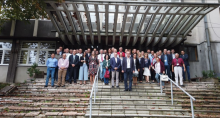Use and Needs of Spatial Data Infrastructures
In the scope of Erasmus+ Cooperation for innovation and the exchange of good practices project “BESTSDI – Western Balkans Academic Education Evolution and Professional’s Sustainable Training for Spatial Data Infrastructures, there was a request to set up a small project on the usage and needs of Spatial Data Infrastructures. The project leader of BESTSDI is Prof. Željko Bačić. The wider objectives of BESTSDI project is to improve the quality of higher education in Geographical Information Science and Technology field, Spatial Data Infrastructure (SDI) and Geodesy, to enhance its relevance for the labour market and society and to improve the level of competences and skills in Higher Education Institutions by developing new and innovative education programmes within the field of Spatial Data Infrastructures. The specific project objectives are to develop, test and adapt new curricula, courses, learning material and tools within the field of SDI. In this context, it would be good to better understand the current usage as well as needs of SDIs.
In this context, a small project was set up including the organization of a survey as well as a workshop. A survey on Academia – Business cooperation was undertaken in June 2019 and a questionnaire was sent to numerous stakeholders. The results of the European-wide conducted survey on Academia-Business needs in education and cooperation in field of SDI was presented in a workshop (Sarajevo, 3 September 2019). In total 123 responses were received. The main conclusions from the survey are the following:
• SDI-competences and necessary (in particular basic SDI knowledge) and in demand
• Academia – Business cooperation is (very) important
• Academic SDI-education is (very) relevant for labor market – but better alignment with technological developments is needed
• Academic SDI-education is (very) relevant for business companies (by workshops, collaboration, experiences exchange, better communication, joint projects)
• Necessities + Relevances significant higher for Western Balkan
• Hampering factors for past and future (Lack of qualified personnel)
• Positive attitude about future development of SDI, but without clear picture in which direction
The survey results were presented at the beginning of the workshop and followed by three presentations from business (Alma Taba-ković), academic (Prof. Medžida Mulić) and governmental (Dr. Slobodanka Ključanin) sector providing specific view about this topic. Further, an EU view was given on academia-business cooperation by Andreas Wytzisk and about broader scope and future of SDI by Danny Vandenbroucke. At the end a discussion took place.


